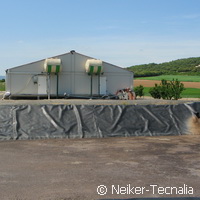From Organic Waste to Fertilizer
Bioenergy currently accounts for more than two thirds of total renewable energy in the EU. Within the bioenergy sector, the increased use of biogas opens up new fields of applications, where biomass has played not a major role so far. In biogas plants, biogas can be produced by using numerous different input substrates. Organic materials are essential as substrates for generating biogas, and the key starting point for the production process. The types of material uses range from domestic organic waste, green and plant wastes, communal sewage sludge, energy crops (corn, grass, millet) to industrial food waste. The Basque Institute for Agricultural Research and Development, Neiker-Tecnalia, and the Guipuzkoa-based company Ekonek plans to build a pilot plant to treat organic waste and turn it into high, added value fertilisers. The facility will enable the organic material resulting from biogas plants to be effectively put to use. The plant will be located on Neiker-Tecnalia's agricultural land in Arkaute (Álava, Basque Country). The project will make use of organic matter following the anaerobic digestion process, which consists of subjecting the matter to a decomposition process in oxygen-free conditions. Biogas is obtained from this decomposition. The matter resulting from the process is called digestate. Neiker-Tecnalia is planning to make use of this product, frequently regarded as waste, and turn it into high quality organic fertiliser that could be ten times more productive than conventional types. This type of fertiliser could be used on added-value vegetation such as sports lawns, ornamental crops and delicate agricultural crops. Fertilisers can be beneficial or detrimental to the environment depending on how they are used and what they contain. The bio-fertiliser obtained here will be produced by reusing organic waste which until now has not been put to any use. This will be a good alternative solution for farmers, because inorganic fertilisers are known to cause problems to the soil and humans through the soil and into groundwater. The process to obtain bio-fertiliser basically consists of subjecting the digestate to a process known as chemical hydrolysis, followed by a high-efficiency granulation process. A number of reagents are then added to the digestate, which is in a liquid or semi-liquid state. This causes the fibres to dissolve, so that they can then be turned into microgranules. Obtaining a product in the form of small granules means significant advantages for transporting and storing purposes, and for the practical aspects when using it. One of the main tasks of the Neiker-Tecnalia researchers will be to ensure that the resulting microgranules have optimum chemical and agronomic characteristics. In this respect, it is particularly important to obtain fertiliser with a balanced level of nitrogen, phosphorus and potassium. Experts believe that the facility will be able to treat about 28,000 tonnes of digestate per year, which will produce about 9,200 tonnes of fertiliser. Neiker-Tecnalia is hoping that this pilot plant will be a solution for the agricultural sector that will be environmentally friendly and at the same time economically viable. The microgranules are used in much lower doses than traditional fertilisers, and release their nutrients slowly, which means a reduced impact on the environment. The pilot project is funded with a budget of 1.5 million Euros by the European Union within the framework of a CIP-Ecoinnovation project. The consortium is made up of Neiker-Tecnalia, Ekonek Innovation in Product Upgrading, Blue Agro, and a Dutch company called Colsen.For more information, please visit: -Neiker-Tecnalia http://www.neiker.net(opens in new window)



